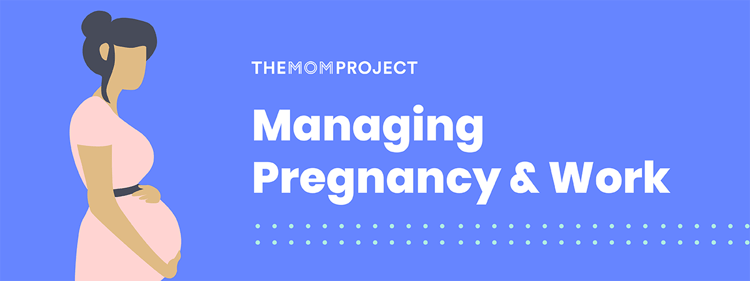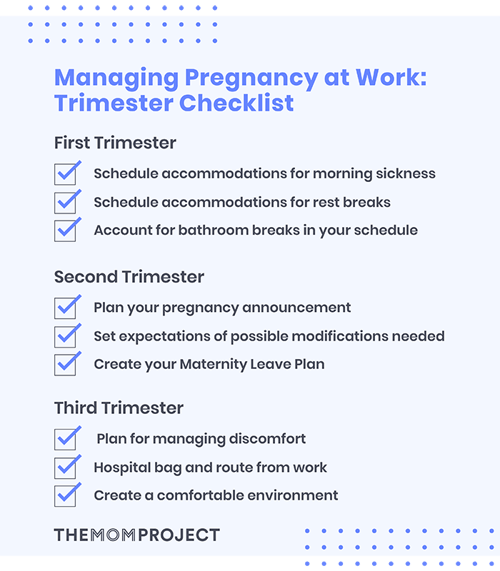Finding a balance while working when pregnant.
Pregnancy brings a host of new experiences; physically and emotionally from the moment you realize it’s happening. Morning sickness, fatigue, doctor appointments, foods you love (and then hate), planning for the baby’s arrival and more all contribute to the constantly changing journey that is pregnancy.
And let’s face it, dealing with all the ups and downs of pregnancy can feel like a full-time job in itself, not to mention the potential to make your actual job more difficult to manage.
Though it may seem impossible to juggle the two, there are ways to help successfully manage work while maintaining a healthy and happy pregnancy.

Your pregnancy schedule and work
Doctor appointments
Strategically scheduling your doctor appointments can go a long way to making these necessary visits less impactful on your work calendar. Long lobby waits (and even longer appointments) should be accounted for as they are usually a given.
👉 Scheduling doctor’s appointments on days that are typically slower workdays can make the long wait times feel less stressful. Choosing the first appointment in the morning, immediately after lunch, or the last of the day can also make your schedule run a little smoother.
Be sure to block out time in your schedule for the usual pregnancy check-ups, as well as any additional doctor appointments and lab tests needed for a high-risk pregnancy. Create a time buffer before and after your appointments, and factor in any time you may need to recover from a long doctor visit. Consider blocking this time off as travel on your work calendar to avoid any scheduling conflicts.
Work deadlines and professional goals
As you plan ahead with project deadlines and set your upcoming monthly or quarterly goals, keep in mind where you’ll be at in your pregnancy. If possible, try avoiding a deadline for a major project in the last two to three months of your pregnancy. This time is better served wrapping up any loose ends and ensuring a smooth transition of any of your duties to other people on your team.
If you have an unavoidable large project looming, break the project deadlines down to smaller, easily achieved milestones that lead to successful completion and can easily be handed off in cases of emergency. If project deadlines extend past your due date, designate co-workers to cover your responsibilities while you’re out. Provide detailed instructions as part of your maternity leave preparation and you can rest easy knowing the appropriate steps are being carried out to finish the project successfully.
In short, don’t give yourself a mountain to climb but instead a steady incline. This will serve you during your pregnancy; logistically, physically and mentally.
Your pregnancy stress and work
From worrying about the health of your baby, to the delivery and motherhood—there’s a lot on your mind. Work can exacerbate that stress, so try to carve out time to manage it as much as you can. Seek out support and relief with self-care activities like prenatal yoga, massage, pampering, and mother support and networking groups.
As obvious as it may seem, rest is imperative to relieving stress. Schedule rest breaks, nap times and go to bed early. Getting your rest is not only vital for the health of you and baby, but something you may have more trouble getting once the baby arrives. You’re experiencing a major change in your life, so it’s sensible you don’t treat your day-to-day as business as usual, too. Keep in mind that you won’t be pregnant forever, and find peace in knowing that this pregnancy-related stress shall pass.
👉 Try not to worry about things you can’t control or that you don’t need to worry about yet. It may be easier said than done but if you’re only 12 weeks pregnant, it’s not time to worry about getting cognitive baby toys just yet.
Your pregnancy symptoms at work
Pregnancy is a whirlwind of varying emotions and physical changes, but mostly, it’s a very joyful time. From tracking your baby bump to choosing names, the planning of bringing a child into the world presents a whole new, particularly special perspective on life.
Excitement for your baby’s arrival typically outweighs any physical discomfort or heightened pregnancy hormones along the way, but they can arise as your pregnancy progresses. Thankfully, there are ways to help manage and alleviate them throughout each trimester.
 First Trimester
First Trimester
Pack your snacks and plan your bathroom route
Oftentimes, morning sickness strikes in the first trimester before you’re showing and revealing your pregnancy. Try to work with it and prepare by having a few items on hand to help alleviate morning sickness, like crackers and water, and ginger ale. Having a fast track to the bathroom mapped out or even a trash can along with napkins there at your desk with you can help, too.
If it’s possible and you’re comfortable with it, discuss your morning sickness with your manager as you may be eligible for temporary disability and could potentially receive accommodations, like working from home until the morning sickness passes.
Track your energy level
Also more prominent in the first trimester are severe levels of fatigue and exhaustion. Your body is working in overdrive to literally create a human. It takes a lot of energy, blood flow and hormones. Be mindful of your energy level and take short breaks throughout the day to manage your exhaustion. If you can, try staying off your feet as much as possible.
👉 If there are certain parts of the day you know you feel those crashes coming on, consider blocking those times from your calendar to catch up on emails and admin work to avoid important meetings and calls during these times.
Leave time for bathroom breaks
As your uterus expands to make room for a baby, it’s pushing down on your bladder and increasing your need to pee in the process. To assist with the urgency and frequent need to use the bathroom, ask to be moved closer to the bathroom. To help manage your schedule surrounding your constant pee breaks, book your meetings with 10-15 minute breaks in between.
Be mindful of your mental state
Due to the ever-changing state of pregnancy, it’s possible for your mental state to have its ups and downs, as well. It’s very important to check in with yourself and stay cognizant of your overall well being. Whatever it looks like to take care of your mental state, take the time to do it.
If you feel down more than usual or even find yourself more emotional, address it and consider if it’s interfering with your focus, productivity and overall happiness and health. Having a discussion with your doctor can be a good start in receiving management tips, as well as holistic and medicinal approaches.
Surrounding yourself with support is also important. Reaching out and relying on family or friends—and even trusted co-workers can provide the comfort and security you need while navigating pregnancy, work and impending parenthood.
📖 Read more: Maternal Mental Health Resources
Alleviate your aches and pains
A slew of aches and pains come along with all three trimesters of your pregnancy, however during your first trimester you might experience headaches and cramps.
Whether it’s caffeine withdrawal or dehydration, headaches can be common. Over-the-counter acetaminophen, like Tylenol, is usually safe to take while pregnant, but talk to your doctor to confirm what’s best for you.
As your uterus grows, cramps can occur. Staying hydrated at work can help, along with rest breaks integrated into your schedule. When water doesn’t seem to suffice, Pedialyte can help provide you with the additional hydration needed.
If either of these symptoms can’t be alleviated and interfere with your work, address it with your manager to see if certain accommodations can be made. Implementing rest breaks, temporarily working from home or even shorter work days are ways to ensure you’re getting the rest you need
Second Trimester
Baby announcement and planning
After 12 weeks, parents typically feel more comfortable telling people about their pregnancy. Along with telling close friends and family, you may feel ready to start discussing your exciting news at work, too. This is a good time to help your colleagues understand your work boundaries while pregnant. Clarify what they might expect from you in terms of a different schedule, work environment, and having a monthly doctor’s appointment.
📖 Read More: Determining When to Disclose Your Pregnancy at Work
Along with sharing your news, it’s a good time to start piecing together your maternity leave plan. Ideally, you want to have plans solidified far enough in advance just in case you take your maternity leave sooner than expected. In short, it’s a good idea to have everything work-related checked off your maternity leave preparation list by the end of your second trimester.
Give yourself time to rest
The second trimester is usually the point in your pregnancy where you start to feel better and more energized, but your body is still working hard to nurture and grow a healthy baby so continuing to rest and stay off your feet is still important. Be sure to pay attention to any signs your body is giving you to take it slow.
Create a comfortable environment
As your belly continues to grow, your lower back may feel the strain and you may experience backaches. Cushioning your chair with an ergonomic pillow or practicing prenatal yoga and stretching might do the trick. If the pain persists, discuss other options with your doctor and be transparent with your manager if any modifications to your schedule or work environment are needed for relief. For instance, maybe a different desk chair, the need to stand during conference meetings or time in your schedule to stretch may be necessary.
Glucose test and mid-pregnancy check-up
As you reach the middle mark of your pregnancy journey, another ultrasound is scheduled, as well as a glucose test anywhere between 20-24 weeks. From finding out about the gender (if you choose to do so) to seeing how your little bean has grown, this can be a super exciting time for a lot of reasons; but can also be a time that determines the rest of your pregnancy journey.
Test results, such as gestational diabetes might arise and additional doctor’s appointments and accommodations may need to be scheduled. Higher-risk pregnancies are common, but be sure to listen to your body and your doctor, and take the time you need to rest and manage the symptoms.
Third Trimester
Manage your discomfort
At this point in your pregnancy, the discomfort is getting real. A growing belly, crazy cravings, swelling in your legs and feet, back pain—there’s an endless list of uncomfortable third-trimester side effects. Don’t be alarmed if things that were once simple, like putting on your shoes or shaving your legs (not to mention—sleep!) become more difficult.
Whether it’s the return of the overactive pregnant bladder, prenatal insomnia or back pain, good sleep and second nature actions can feel elusive. Though temporary, this level of discomfort and difficulty to complete an otherwise simple task can affect your workday. Going to bed earlier and giving yourself more time to prepare for and wind down from the day can help remedy some of these pregnancy discomforts.
👉 Your wardrobe also plays a big role in creating comfort during your pregnancy, especially when you’re sitting for most of the day or expected to stand for long periods of time. Comfortable shoes and loose or expandable clothing is key. If you experience swelling in your feet and legs, try wearing leggings or even tights that are easy to move in while offering compression relief.
Another source of late pregnancy discomfort are Braxton-Hicks. Braxton-Hicks are spontaneous uterine contractions but are not indicative of labor. They can reach an intense level and sometimes serve as a hindrance throughout your day, which can be a pain when productivity is of utmost importance.
Unfortunately, there is no remedy or way to relieve Braxton-Hicks, so it’s important that you create a work environment that makes the later days of pregnancy as comfortable as possible. For instance, if it’s possible, try only scheduling phone meetings, or discuss with your work if it’s possible to work from home.
Early labor and late pregnancy surprises
Even with a planned induction or c-section date, labor can happen earlier than expected. With that unknown, being prepared at work is just as important as being prepared at home.
Consider having an emergency hospital bag on hand at the office in case you go into labor. Additionally, create a plan of action. Who is taking you to the hospital, and how are you getting there? Map out the route you might take from your place of work.
Setting expectations with work and yourself
Work is important, but the health of you and baby is the most important. In order to avoid unforeseen surprises at work, set expectations with your co-workers and manager about any possible changes in your work environment or schedule due to your pregnancy. This could also alleviate any unnecessary worries you have with managing work and your pregnancy, and help you feel more comfortable and in tune with yourself as your pregnancy progresses.
📖 Read more: How to Plan for Your Maternity Leave
Support throughout your working motherhood journey
Get access to career opportunities with family-friendly employers, job search and career development resources, and a thriving community of moms and allies with The Mom Project. 



